'The White Lotus' Standout Murray Bartlett on Armond's Fateful Finale Intrusion
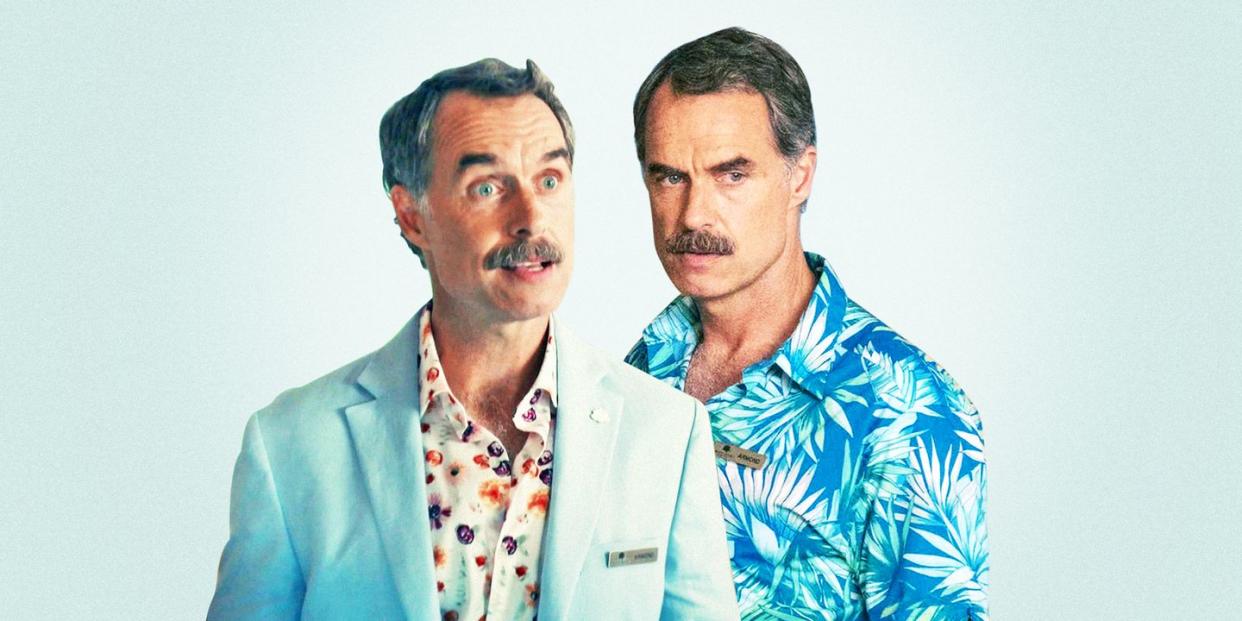
- Oops!Something went wrong.Please try again later.
- Oops!Something went wrong.Please try again later.
This article contains major spoilers for The White Lotus finale.
Enraged by the entitled honeymooning husband Shane, terribly stressed by a robbery on the property, and days into a ketamine-fueled bender, Armond, general manager of the White Lotus, finally snaps in the season’s finale. Nothing matters anymore. Fuck this place.
So he enters into that terrible prick Shane’s hotel room, pulls down his pants, squats, and shits straight into his suitcase full of Vineyard Vines polos.
It’s a moment of autonomy, of self-determination, of sweet revenge—until it quickly isn’t. Shane returns to the room, Armond hides in the closet in a panic, but it isn’t long before Shane smells the gift left for him in his suitcase. In a final, brilliant moment of irony, the Pineapple Suite turns on its keeper, as the knife provided to slice the fruit is used in self-defense against the themed room’s intruder.
The final twist is one of many jaw-dropping scenes in Mike White’s HBO miniseries. Over the course of six hour-long episodes, the series explores white privilege and classism with humor (Jennifer Coolidge wailing “she was a nymphomaniac”) and wit (every line that comes out of Sydney Sweeney’s mouth). But Murray Bartlett’s performance as hotel manager Armond is a standout, as the resort’s center of gravity, the sun around which all the hotel guests revolve. The Australian actor known for his role as Dom Basaluzzo on HBO’s Looking delivered a performance both relatable for anyone who’s ever worked in customer service, but also hopefully not too relatable—unless you’ve ever been driven to act upon your worst, chaotic impulses. Hence the suitcase shit. Which, by the way, wasn’t real. Bartlett let us in on that and much more before the season’s highly anticipated Sunday night finale.
Esquire: The whole world is obsessed with The White Lotus. Have you been watching in real time or have you seen it all already?
Bartlett: I've seen it. I saw it when it wasn't quite finished. I feel like I should go back and watch it again. We had a premiere in L.A. a couple of weeks ago, and they had it on the big screen, which is kind of awesome and it looks so beautiful. They've done such a beautiful job with the coloring and all the visuals, so I need to go back. It's always weird watching yourself so I might not make it through again, but I did really enjoy it. Mike White is so brilliant and the show is so smart and unsettling and funny.
I know when you took the part, you had only read the script for the first episode. Did you have any predictions for who died after reading just the first episode?
I assumed that it was Jake’s [Shane’s] wife after reading the pilot. Then, I spent a lot of the rest of the scripts confused and wondering who it was, but I think that's part of the fabric of the show, playing around with that. I feel like it's great at holding up the suspense and kind of surprising you all the way through.
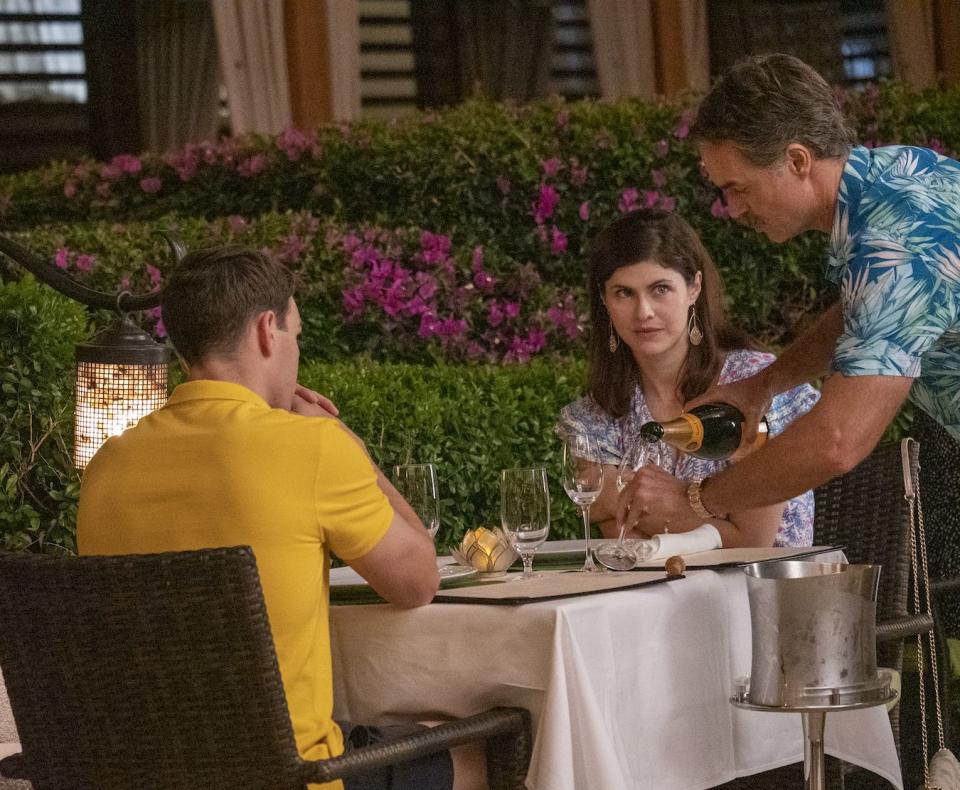
Do you feel that Armond is a tragic character? How did you feel about his arc?
I feel like in some ways where he ends up is sort of a release from this hell that he's in. So in that way, I don't think it's tragic, but I think there are a lot of tragic elements about him. I think what's brilliant about Mike White is that he keeps you guessing. There are moments when he's super high, when he's having a lot of fun, and I mean, I guess that it's drug-induced, but there's moments when he's sort of on a tear where you're like, "Oh, this guy's kind of coming into his power." There is tragedy to the whole thing, but it's not that simple.
I think Armond is the same. I feel like there's some of those things from his backstory that were in the scripts that aren't included in the show, for good reasons. He has a lot of unfulfilled dreams and he wanted to be a performer, and he's in this job where he's kind of a performer but dealing with these obnoxious people. That part of him is tragic, but he finds release from it in a weird and sort of dark way, I think. I feel like he's sort of representative of what it is to be a casualty of this sort of societal system. Although he can deal it out as much as the people above him, he has enough self-awareness to know that it's all fucked up.
I couldn't help feeling like he represents some of the frustration that I feel with the kind of hierarchy that plays out, and particularly the way we've seen it in the last year or so with the election and pandemic and stuff, that he is a kind of person that is driven crazy by the unfairness and the shit that comes from an unfair system. I mean, he's not every man by any means, but I feel like he's representative of that. What do you do when that's your life? You're embedded in this system that's completely unfair and you have to pander to these completely entitled people. It just drives you crazy. It's insane.
Yeah. I liked that in the end Shane's wife comes back to him, because if she would have left him, he would have lost something, and the whole point is that the white, privileged person never really loses out on anything. Even when they stab someone.
Yeah. I'm really interested to see how people respond to that. I was so disappointed initially, and then I was like, "Oh, that's so right." I think that's a really great thing about Mike White and this shows. They never let you off the hook.
What was working with the cast like?
I mean, it was dreamy. It's not only super talented people, but lovely people, which was fortunate because we're all quarantined together almost three months. It could have been a nightmare, but it was amazing. And I was the lucky one; my character gets to dip into all the stories, so I got to play with them all. We were so fortunate to have these incredible scripts and this just amazing group of people, so well-cast and so talented to play around with all the moments. It was amazing. It was a very bonding experience doing a show during the pandemic and we were completely confined to that resort, poor us. And so we went to the beach at the end of every day and swam together. Fortunately, because it's a lovely group, it's in my memory as this kind of dreamy, surreal sort of summer camp. It was awesome.
Do you have any stories that stand out or memorable moments from filming?
Kind of a million. I don't know, none of them are probably going to sound very funny in the retelling, but you can't help having memorable moments with Jennifer Coolidge because she's so awesome. She's so spontaneous. And the scripts were brilliant—you didn't want to go off script that much because it was just so awesome, but she always brings that bit extra. Just trying to keep a straight face in scenes with her is so hard. It's so joyful watching her because she's so awesome and I'm such a big fan of her.
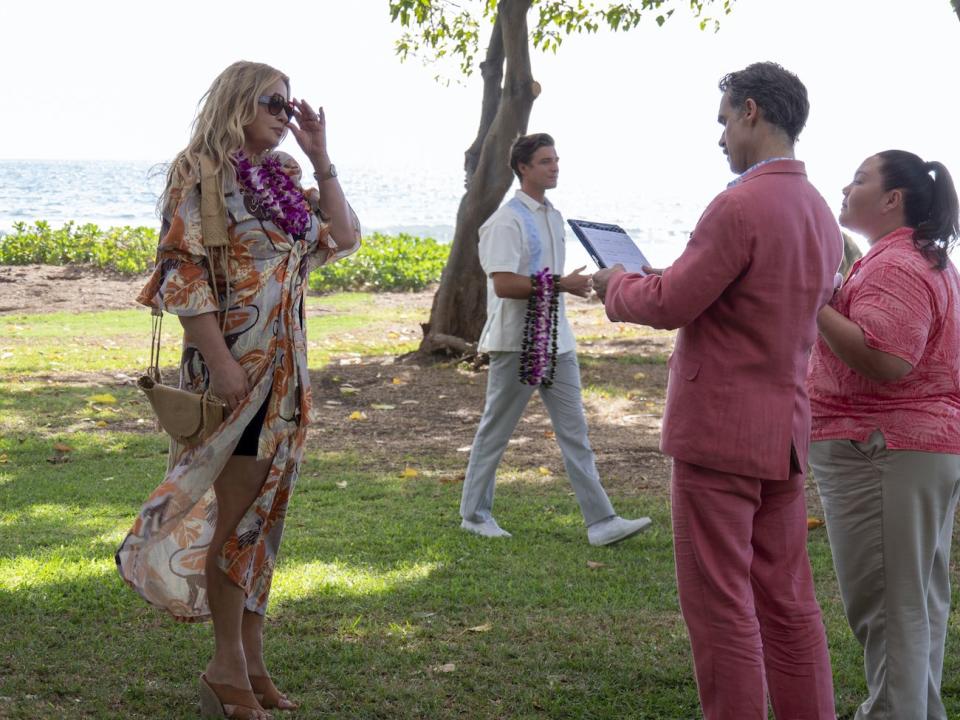
So I have to ask about the suitcase poop.
Do you?
I do. Was that real, how did that happen? Walk us through it.
I can't break the magic. All I can say is that when I saw it, I was shocked. I did not expect that it was going to be so explicit and look so real. I think it's so brilliant in terms of the shock value. It was very methodically done, and very respectfully done, for me, which was really great. Those scenes are always weird to do and something like that, obviously it's just going to be awkward. There's no way around it. Who's going to be comfortable taking a shit in a suitcase with your pants around your ankles? All I can say is I give great props to the props department. They did an amazing job with it. Maybe talk to the make-up department. They can walk you through it a bit more.
Now I'm even more curious.
I know. It's amazing. I didn't realize it would look so authentic.
What was your favorite scene to film?
Oh my god. The whole shoot was really fun. Oh, you know, there's a scene where Armond is really high and there's music playing. I can't remember the name of the music, but this classical music. And they played it on set and it's the first time that I get really high. I have to walk through kind of greeting everybody and it's kind of in slow motion, and the music was playing, and it was such a fun scene to film. To kind of get into that mode of feeling high. It's sort of like a gladiator going to the...whatever you call it. The ring! Because he's about to go and do this dinner service. It was super fun, but it was all super fun. There was another scene where Armond is super high. I guess the bits where I'm super high are what's coming out as my favorites. When I'm serving dinner and it's just sort of a montage where I take this family down to their table, kind of like a dance. And that's what it felt like, I was in a dance with the camera that we were following each other around and doing this sort of choreographed bit.
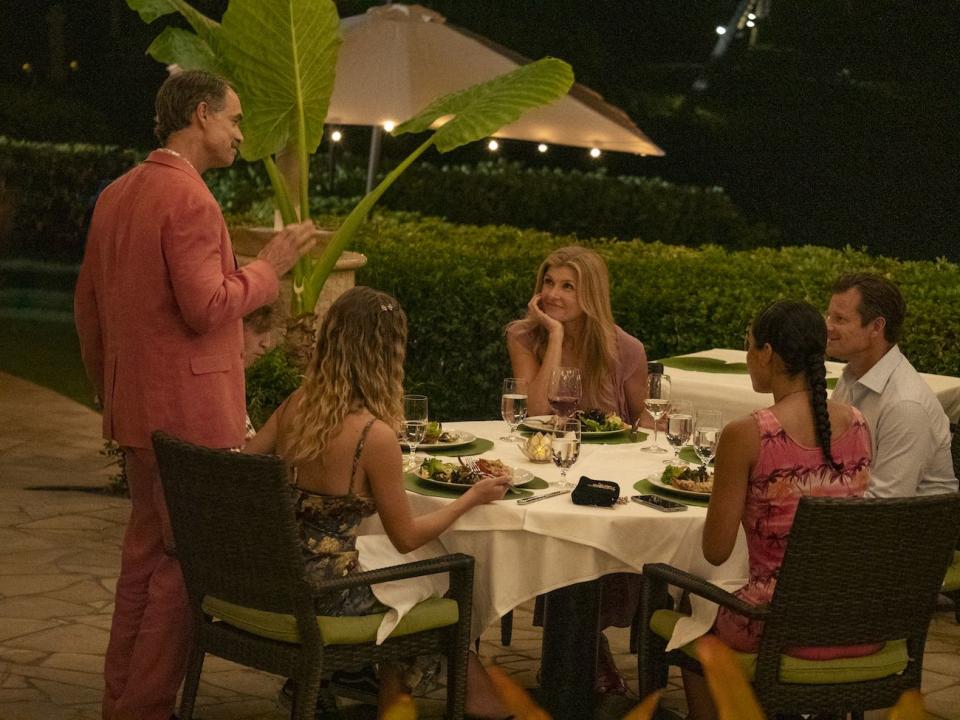
Did you learn anything about yourself playing the role?
Yeah, I think you always do, playing any role. For me anyway, one of the things is figuring out the aspect of yourself that is that character and then kind of pulling that aspect out. And that's very confronting when it's a character like Armond, because he exists inside of me, so I had to face some of those aspects of myself and I learned a lot. It made me very aware of not being a dick in those kinds of situations, like at a hotel, or being in a restaurant or whatever, because it's very easy for us to slip into this mode of entitlement when we're being served by someone that we should get what we want. It's made me very aware. I would like to think that I don't act on those impulses, but just knowing that the impulses are there is kind of confronting. One of the main things for Armond and me is that I tend to—less and less as I get older, hopefully wise and not jaded—be a people pleaser.
I love that Armond, that's his job to please people and to make people happy and to give them what they want. But he also has this very turbulent inner life that wants to scream at them. I think we can all relate to that to a certain extent, but especially if you're a people pleaser where sometimes particularly when I was younger, people walk all over me, and you're like "these fucking assholes." It was interesting to explore that through him. Also, Armond gets the opportunity to follow through on some of the payback impulses that I would never do as a person in my real life. Sending people out on the nightmare boat ride, that was very satisfying. I probably shouldn't admit that.
How did you prepare for this role?
Like most actors, I worked in hospitality, particularly when I was starting out, so I have a lot of my own reference points of dealing a lot of the time with people who are lovely, but also those moments that you don't really forget of the obnoxious people, or the entitled people asking ridiculous things of you. I also have a lot of friends who work in hospitality. I have this one friend who regularly writes this thing called "Pennies From Heaven", which are these little interactions that he writes out with guests that are hilarious, and usually obnoxious. So I hear all the stories, and I've had my own experiences. I think it's great to have had that experience of being in that sort of role, just because it makes you better, and it makes you hopefully a little more self-aware. It makes it harder to treat people like they're servants. You're like, "Oh, that's a human being." So I had a lot of very clear reference points, but it was also cool that we were staying in the resort where we were shooting. It was mostly shut down or at least partially shut down for the most part, but then it sort of opened up towards the end of the shoot. So we got that vibe of the actual guests, of the music that they play, of dealing with the staff who are not as intense as Armond, but little elements that were useful. Also staying in a resort and having to realize when the hotel is short-staffed and shut down because it's COVID, and my laundry hasn't come back for three days, and I'm feeling a little bit like, "Where's my laundry?" I call up, and I'm like, don't be a dick. So it was kind of cool in that way.
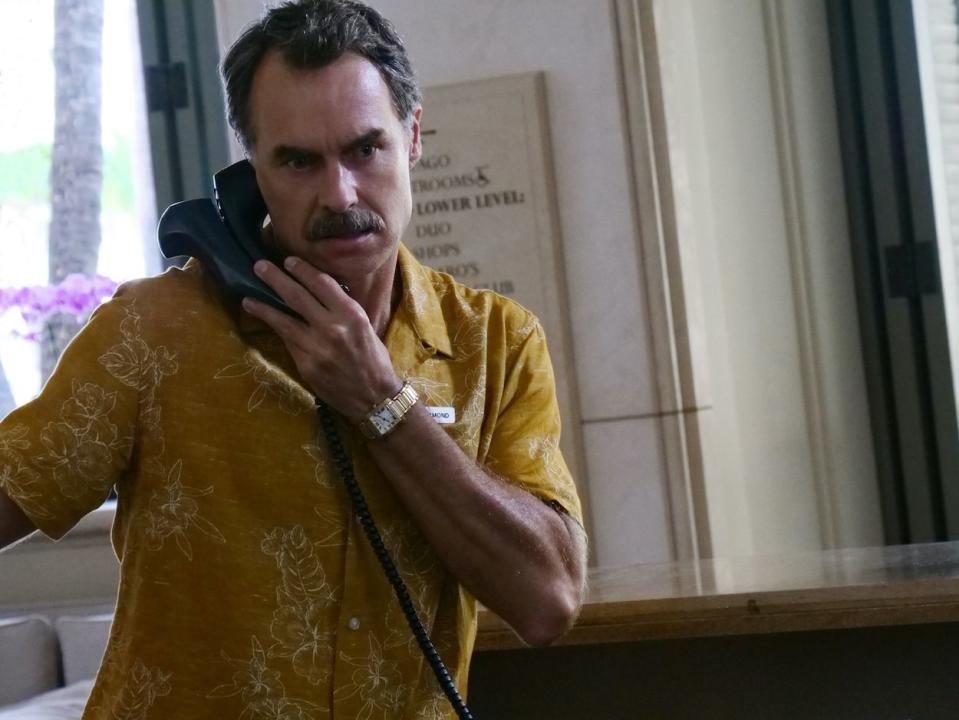
That's very meta. You were actually living the show.
The whole thing was. It was crazy because we were actually there, so you couldn't separate completely, which I think was really great. I think it was really great for the show and for all of us to be in that headspace.
What's next for you?
I'm doing another limited series with HBO called The Last Of Us, and I can't really say much about it, except that I'm really excited. I think it's going to be great. It's an amazing world and a great cast and I love what I get to do in it, and the scripts are really great again.
You Might Also Like

